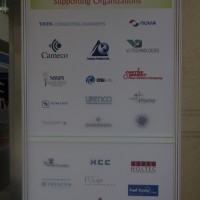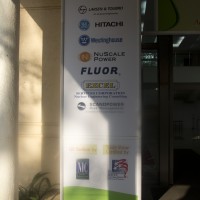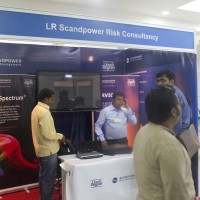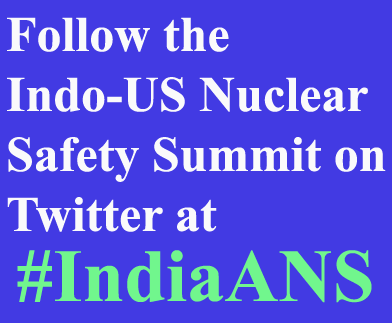Post #2 from Mumbai: The Indo-US Nuclear Safety Summit
Margaret Harding is blogging from the ANS-sponsored Indo-US Nuclear Safety Summit in Mumbai, India.
I had hoped to keep more material coming, but technical difficulties and jet lag have limited me some. More on day 1 of the conference. The pictures are from the exhibit hall and the front entrance.
One of the speakers spe nt a little time talking about the regulatory environment. His words were important for all countries to heed. Regulation must remain science based. Diverse knowledge should inform regulation, no single technology or group should dominate. A regulator with solid technical knowledge can be responsive to new technology and new ideas without creating excess burdens on the developers and still maintain safety and oversight. [Aside from Margaret: Points we should certainly listen to in the United States as well. Nuclear Regulatory Commission regulation is frequently too technology specific and t
nt a little time talking about the regulatory environment. His words were important for all countries to heed. Regulation must remain science based. Diverse knowledge should inform regulation, no single technology or group should dominate. A regulator with solid technical knowledge can be responsive to new technology and new ideas without creating excess burdens on the developers and still maintain safety and oversight. [Aside from Margaret: Points we should certainly listen to in the United States as well. Nuclear Regulatory Commission regulation is frequently too technology specific and t he ability to keep up with new developments has stretched the NRC's staff at times.]
he ability to keep up with new developments has stretched the NRC's staff at times.]
Another great comment focused on the impact of our words. While conservatism in our design processes is important, when excess conservatism is applied to emergency situations, we can create fear where no risk exists and impose significant restrictions on a population far in excess of the actual risk. Such evacuations and lengthy abandonments of home and business create burdens on the population that do far more harm than the original risk we were trying to protect against. The Fukushima aftermath is an example of such impacts.
 After lunch, there was a session for those of us who have not had much (any?) business dealings in India to learn a little more about the United States' trade relationship with India and the status of any nuclear opportunities that might exist. Judy Reinke, minister-counselor for commercial affairs for the US embassy in India, gave us some really interesting information. India is growing quickly and the middle class is growing even faster. The workforce is generally young and very entrepreneurial. India is looking for ways to continue to grow. The government is very focused on inclusive growth that brings benefits to those who are deeply improverished as well as to the middle class. India's parliamentary government is currently such a very weak coalition, however, that coming to a decision can be very difficult because all the partners in the coalition must agree before moving forward. This has had some impact on regulatory reforms that are needed for full engagement by outside businesses.
After lunch, there was a session for those of us who have not had much (any?) business dealings in India to learn a little more about the United States' trade relationship with India and the status of any nuclear opportunities that might exist. Judy Reinke, minister-counselor for commercial affairs for the US embassy in India, gave us some really interesting information. India is growing quickly and the middle class is growing even faster. The workforce is generally young and very entrepreneurial. India is looking for ways to continue to grow. The government is very focused on inclusive growth that brings benefits to those who are deeply improverished as well as to the middle class. India's parliamentary government is currently such a very weak coalition, however, that coming to a decision can be very difficult because all the partners in the coalition must agree before moving forward. This has had some impact on regulatory reforms that are needed for full engagement by outside businesses.
India's economy has been growing at 8 percent until the last few years, when growth slowed to 6-7 percent. Slower economic growth added to continued population growth has made the goal of inclusive growth a very difficult goal for India. The need for infrastructure and energy to get the economy growing again has become a strong driver. This need benefits the nuclear industry, because getting reliable electricity to businesses and manufacturers is critical to a successful growth of the economy. Businesses that do not have power do not need workers. Workers who don't work don't get paid, which results in continued poverty.
Finally, India really only opened up to global trade in 1991. The government has continued to reform laws and regulations to make global markets more accessible both for export and import. But, again, a weak government makes such reform more difficult.
That's it for tonight. Tomorrow, I'll post a summary of Dr. Patrick Moore's speech and subsequent journalist interviews, as well as more information about the session I participated in regarding public communications and what both countries can do better.

________________________

Harding
Margaret Harding has almost 30 years of experience in the nuclear industry in technical design, licensing, and quality issues. She worked for GE-Hitachi for 27 years with positions of increasing responsibility, leading to vice president of Engineering Quality. Two years ago, she left GE-Hitachi to start her own consulting business to help companies with business ventures in the nuclear industry. She is a guest contributor to the ANS Nuclear Cafe.







